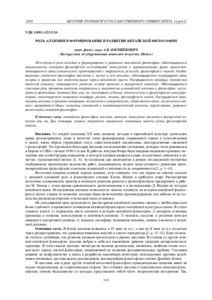Please use this identifier to cite or link to this item:
https://elib.psu.by/handle/123456789/22985| Title: | Роль алхимии в формировании и развитии китайской философии |
| Authors: | Филиппович, А. В. |
| Issue Date: | 2018 |
| Publisher: | Полоцкий государственный университет |
| Citation: | Вестник Полоцкого государственного университета. Серия E, Педагогические науки. - 2018. - № 15. - С. 114-120. |
| Abstract: | Исследуется роль алхимии в формировании и развитии китайской философии; обосновывается актуальность историко-философских исследований эзотеризма и иррациональных форм мышления; показывается связь алхимических представлений с мифологией, религией, философией и наукой. Особое внимание уделяется философии даосизма и месту в ней алхимии; обосновывается неразрывная связь теории и практики как отличительная черта китайской мысли. Раскрываются основные положения даосской алхимии; показывается различие между внешней и внутренней алхимией. Обосновывается ключевая роль принципа аналогии микрокосма и макрокосма в китайской алхимии и философии; исследуются важнейшие понятия Дао, инь, ян, получившие в Китае алхимическую и философскую интерпретацию; анализируется символизм киновари, ртути, золота, философского камня. Раскрывается взаимосвязь алхимии и практик инициации, космологии и антропологии, объясняется идеал «целостного знания»; выявляются общие моменты китайской и западноевропейской алхимии, определившие развитие восточной и западной философии.= The article examines the role of alchemy in the formation and development of Chinese philosophy; stresses the relevance of philosophical studies of esotericism and irrational forms of thinking; shows the relationship of alchemical ideas to mythology, religion, philosophy and science. Particular attention is paid to alchemy and its place in the philosophy of Taoism, to the connection between theory and practice as a distinctive feature of Chinese thought. The article explains the main principles of Taoist alchemy and shows the difference between external and internal alchemy, underlining the key role of the principle of analogy of the microcosm and macrocosm in Chinese alchemy and philosophy; the author analyzes the important concepts of Tao, Yin, Yang, which were further developed in China by means of the alchemical and philosophical interpretation, explains the symbolism of cinnabar, mercury, gold, the philosopher's stone. The author shows the interconnections between alchemy and initiation, cosmology and anthropology, analyzes the significance of the ideal of the “holistic knowledge” and the common elements in Chinese and Western alchemy, which shaped the development of Eastern and Western philosophy. |
| Keywords: | Педагогика Государственный рубрикатор НТИ - ВИНИТИ::ОБЩЕСТВЕННЫЕ НАУКИ::Народное образование. Педагогика Китайская философия Алхимия Даосизм, Эзотеризм Внешняя и внутренняя алхимия Инь Ян Дао Киноварь Золото Микрокосм Макрокосм Инициация Materia prima Философский камень Chinese philosophy Alchemy Taoism Esotericism External and internal alchemy Yin Yang Tao Cinnabar Gold Microcosm Macrocosm Initiation Materia prima The philosopher's stone |
| URI: | https://elib.psu.by/handle/123456789/22985 |
| metadata.dc.rights: | open access |
| Appears in Collections: | 2018, № 15 |
Files in This Item:
| File | Description | Size | Format | |
|---|---|---|---|---|
| 114-120.pdf | 228.22 kB | Adobe PDF |  View/Open |
Items in DSpace are protected by copyright, with all rights reserved, unless otherwise indicated.